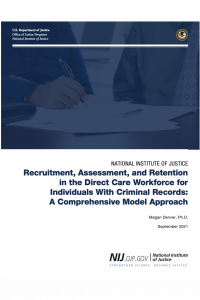Recruitment, Assessment, and Retention in the Direct Care Workforce for Individuals With Criminal Records: A Comprehensive Model Approach
National Institute of Justice
As this report discusses, demographic shifts in the U.S. are creating a heightened need for direct care workers. The U.S. Bureau of Labor Statistics predicts home health aides and personal care aides will continue to be among the fastest-growing occupations. The author cites that researchers estimate there will be over 150,000 paid direct care positions unfilled in the next decade and a shortage of almost 350,000 direct care workers in the United States by 2040.
Anticipated worker shortages have prompted national conversations about the potential benefits and considerations involved in hiring individuals with criminal records for the direct care workforce. The author argues that linking certain individuals with conviction records to entry-level jobs in this industry could help fill critical shortages, connect this population to employment and potential career paths, and ultimately contribute to successful reintegration and increased public safety.
The goal of this white paper is to identify strategies for connecting individuals with criminal records who do not pose an unreasonable risk to public safety to long-term employment in the rapidly growing health care sector. This paper has five key objectives:
-
Describe the heightened demand for workers in the health care industry and opportunities for hiring qualified workers with criminal records.
-
Review employer concerns, barriers to employment, desistance policy goals, and strategies for incorporating desistance into criminal background check policies.
-
Document existing recruitment and retention challenges in the health care sector more broadly, along with additional challenges that individuals with criminal records may face.
-
Summarize existing estimates on individuals with criminal records in the health care industry and identify where this group drops out in the background check process.
-
Provide strategies to improve recruitment, assessment, and retention of individuals with criminal records in direct care work, including the potential advantages of a collaborative and comprehensive model.
